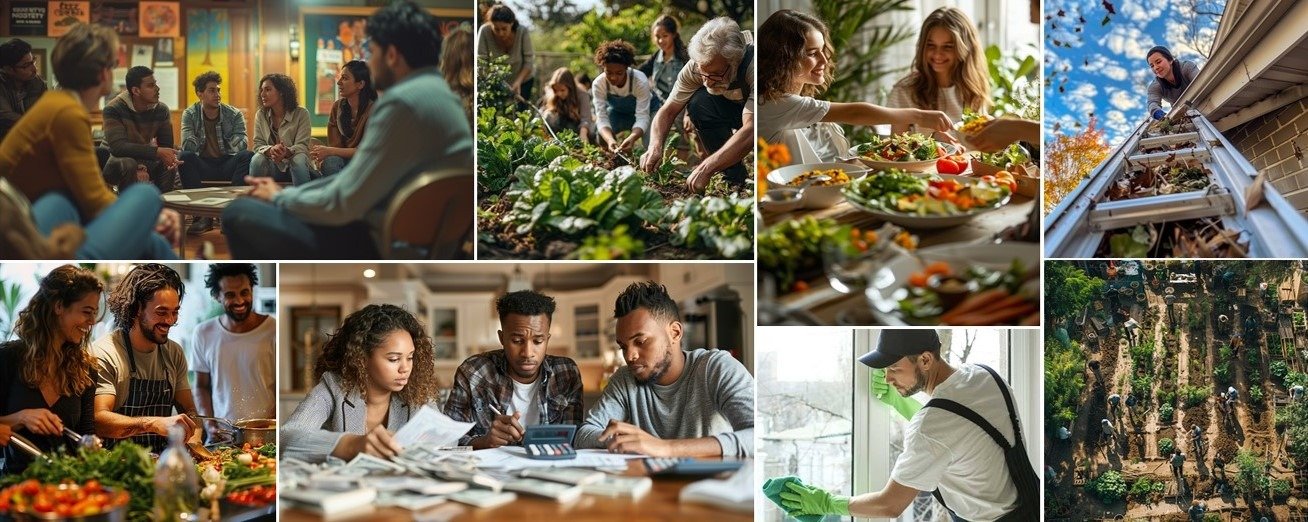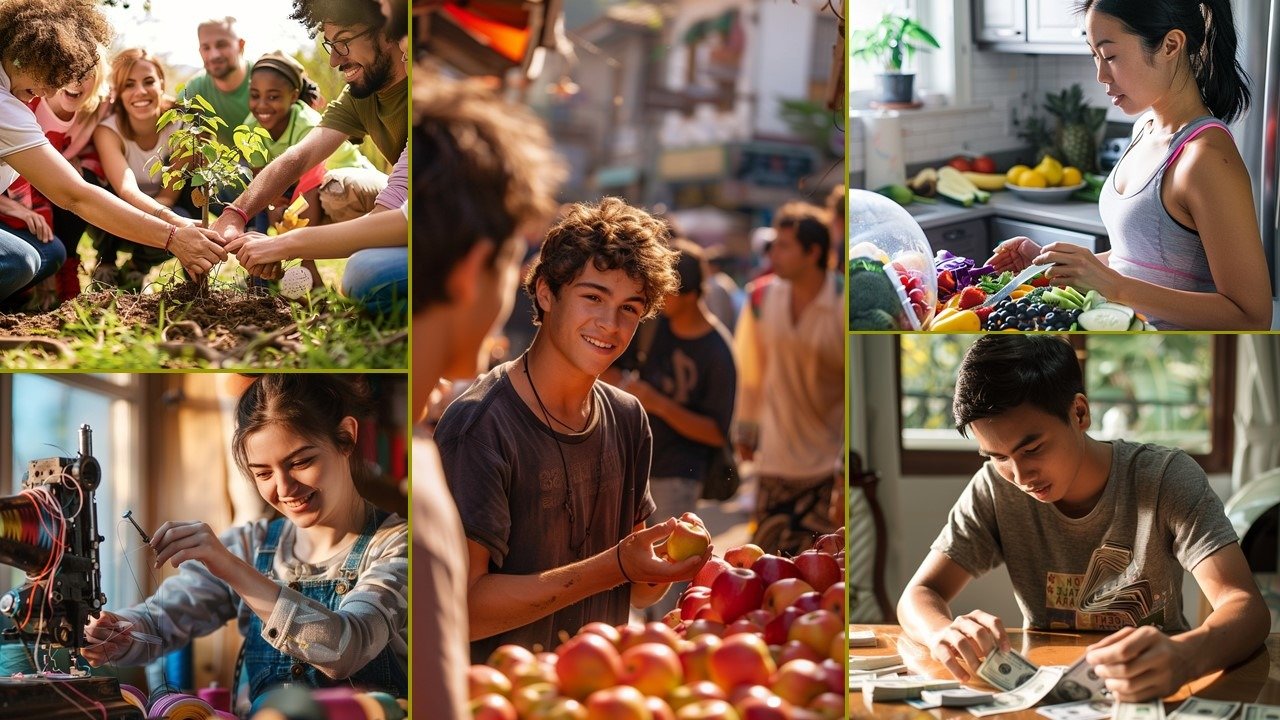
Transitioning to ‘Rich by Association’ Share Economy
Transitioning To ‘Rich by Association’ SHARED PROSPERITY aligning with the principles & practices of ‘ONE CLOAK’ to achieve ethically sustainable economic security via communal union

Knowing oneself is a critical element of sharing with others as it allows us to recognize our needs, communicate clearly, and show empathy towards others; all of which are essential cogs in the wheel of creating enduring progressive, mutually supportive and stimulating collaborative relationships.
For this reason, communitarians making the transition to LIVING SIMPLY are encouraged to set aside time for daily personal reflections aided by journaling to continue the life-long process of ‘Know Thyself’.
The second and most complex adaption required to successfully transition to live by the ONE CLOAK TENET of LIVING SIMPLY, centres around evolving the capacity to ‘SHARE WITH MANY’. At its core this means loving in a liberated way that enables communitarians to embrace and form meaningful relationships with those who share their daily lives, beyond mere sentiment – beyond natural attraction. This means including everyone—without exclusions—into our conversations; lavishing affection on them; inviting each and every one to spend time with us.
Within DEEP UNION, sharing extends beyond emotional connection to also encompass practical collaboration on sustainable living projects that include establishing and maintaining Kitchen Gardens, Permanent Agriculture Food Forests, creating Tiny House Villages, and working side-by-side on Renewable Energy Generation or Rain Water Harvesting projects.
These are only a few of the ways we can ‘rub shoulders’ with those who will be sharing our lives in the very near future – sharing communal living facilities, daily meals and domestic chores, along with collective LOVE-IN-ACTION socio-economic, animal right-to-life and liberty, as well as, ‘boots on the ground – spade in hand’ ecological practical activism.
Bonded, enduring, mutually-supportive relationships are formed through practical engagement. Furthermore, working together fosters understanding, trust, and a sense of shared purpose. It is through this kind of intentional, hands-on cooperation that communitarians develop a greater appreciation for each other’s strengths and weaknesses, enabling the unions to live harmoniously within shared living spaces.
Beyond practical collaboration, on-going commitment to participation in the GESTALT GROUP DEVELOPMENT GATHERINGS augments contributions to harmonious group relations. Group harmony serves as the foundation for building ethically-responsive economies that prioritize shared resources, low-impact living, and responsible ecological stewardship. It is not only the seed from which these ideals sprout, it is also the nourishment, water, and sunlight that allow them to grow into sustainable systems of perpetual peace and shared economic security.
Over time, these systems mature into strong, living trees with many branches, providing shade, shelter, and sustenance to a growing global community of ethically-minded individuals dedicated to making-over the socio-economic and environmental principles and practices of communities across the globe.
Beginning in the fifth year of association and continuing thereafter, communitarians are expected to dedicate significant time and effort to mastering conflict resolution, mediation, and active peace processes. These skills are crucial for maintaining harmony within immediate communal unions, and also need to be applied when interacting with secular entities, including local, regional, and even global government, business, and trade organizations.
Cultivating these skills fosters resilience within communitarian unions as well as the wider world, ensuring that disagreements and challenges are handled with maturity, grace, and respect, which ultimately strengthens the bonds between individuals and groups.
The third key area of adapting to Living Simply through shared living and loving, involves mastering responsible contribution to the management, production and distribution – according to need of common-pot collaborative provisioning’ resources. This includes participatory governance of essential such as food, accommodation, communal living facilities, kitchen gardens, transport and energy, along with clothing, health and dental care, as well as recreation, education, and travel allowances. These skills must be studied, honed, and actively implemented starting with novices formulating their personal budgets to gauge spending against earning.
Moreover, the habit of sharing resources promotes a deeper connection to socio-economic as well as environmental sustainability, which are both inseparably linked. By reducing waste and embracing the idea of collective ownership, those on the path to collaborative living and loving begin to see that our individual needs can be met in ways that do not require overconsumption. As an example, sharing vehicles reduces the environmental impact of transportation, while Communal Kitchen Gardens coupled to Permanent Agriculture Fruit Forests ensure that food is grown organically without pesticides, or artificial fertilizers. Sharing living facilities and also provisioning resources, also contributes to reducing the collective’s, supply chain carbon footprint.
Ultimately, the goal of Living Simply is to prioritize quality of life and well-being over material accumulation, thereby installing the foundations of COMMON WEALTH SHARED PROSPERITY through sharing, cooperation, and mutual support. Through this mindful approach to sharing, communitarians contribute to a more sustainable world while also demonstrating a culture of gratitude and appreciation for all that is provided within the global network of communitarian unions.
Living Simply Together demands the development and commitment to maintaining clean and tidy habits that ensure shared spaces remain welcoming, organized, and functional for all. Regular participation in communal activities such as cleaning, preparing meals, and maintenance cultivates a sense of responsibility and mutual respect among communitarians.
Sharing communal living facilities requires a deep level of appreciation and careful use of resources that everyone utilizes and depends on. In a communal living setting where space, energy, and amenities are shared, individual actions have a ripple effect on the whole group, which is why cultivating clean and tidy habits is not just a matter of personal responsibility, it is LOVE-IN-ACTION that provides evidence of our love and respect for those who care for us and support our quality of life in return.
By keeping shared spaces clean, organized, and functional, communitarians ensure that everyone can utilize and enjoy the facilities. This includes maintaining kitchens, bathrooms, and living areas with a sense of stewardship, recognizing that these spaces belong to everyone and therefore must be treated with care to ensure long-term functionality.
Beyond physical cleanliness, responsible stewardship of communal resources such as energy and water, is crucial. In many eco-aligned communal settings, resources such as solar power or harvested rainwater are finite. Therefore, careful management of these essential resources is vital for ensuring continuance of habitat for people, native animals, as well as collective fruit and forest groves.
Simple actions, such as turning off lights when leaving a room, conserving water while bathing or showering, or using energy-efficient appliances, significantly reduces the communal unions’ environmental impact while also reducing collective living costs.
Additionally, sharing resources such as transportation—whether through carpooling, communal bicycles, or electric vehicles, minimizes ‘wasting the world’ through reducing the need to wound the earth mining for coal or drilling for oil, while also employing ethical consumption.
The key to effective, harmonious and mutually-beneficial ‘RICH BY ASSOCIATION’ SHARED PROSPERITY that is rooted in a planned collaborative economy, lies in open communication and mutual respect. As novice communitarians modify their consumption, budgets and reduce or payout debt in preparation for merging into DEEP UNION, it is crucial to adhere to the guidelines and expectations set by the communal union we are seeking to join, regarding the use of shared resources and facilities. Regular check-ins with the Collaborative Provisioning Committee Leadership Team to address any concerns or offer suggestions for improvement, will ensure a smooth transition to becoming a valuable, contributing member of the global network of communal unions.
Through willingness to contribute to maintaining a culture of transparency and accountability, those new to sharing living space and common pot resources can prevent misunderstandings as well as align with the expectation to share in the care and preservation of ‘Common’ Wealth assets. This usually involves attending communal meetings where those living in union can express needs or propose ideas for better resource management, ensuring that everyone has a voice in how the shared spaces and resources are utilized.
Ultimately, sharing communal living facilities and resources is an exercise in balancing individual needs with the well-being of the group. It calls for ongoing attentiveness, respect, and adaptability, as each person must remain aware of how their actions affect others and the environment. When done effectively, sharing reduces waste and consumption, it also strengthens communal bonds, creating a more connected, sustainable, and harmonious way of life.

Transitioning To ‘Rich by Association’ SHARED PROSPERITY aligning with the principles & practices of ‘ONE CLOAK’ to achieve ethically sustainable economic security via communal union

Deep Union creating & sustaining connected supportive relationships beyond mere attraction & blood-ties For many centuries philosophers have come and gone posing the question, “can

Transitioning To LIVING SIMPLY preparing for deep union sustainable living & loving In today’s world of hyper-consumerism and individualism, transitioning to a simpler way of

Breaking Free of Consumer Cultural Conditioning | reimagining sustainable living through ‘common purse’ collaborative provisioning | Before making any practical changes, a critical step toward

downsizing & decluttering – preparing for shared Prosperity Making Space for Collective Abundance through Collaborative Living As communitarians continue the journey toward LIVING SIMPLY, Step
Financial Foundations of Merging into Collaborative Union | navigating the journey from individual economic provision to the “Rich by Association” Share Economy | Transitioning to

Sharing Life, Love & Resources The communitarian union network’s contribution to eco-social harmony demonstrating the path to perpetual peace through shared prosperity The global network